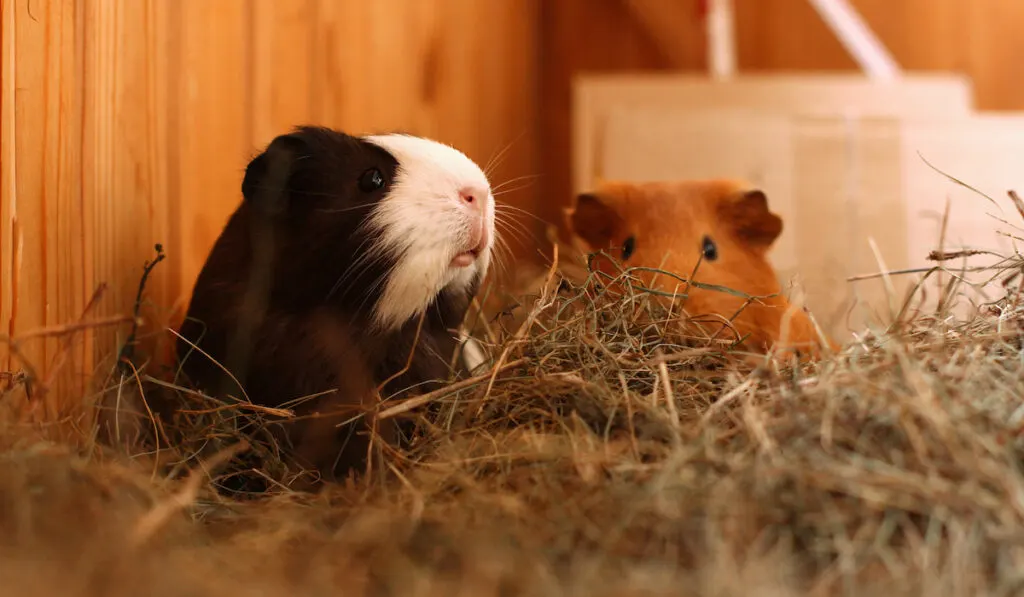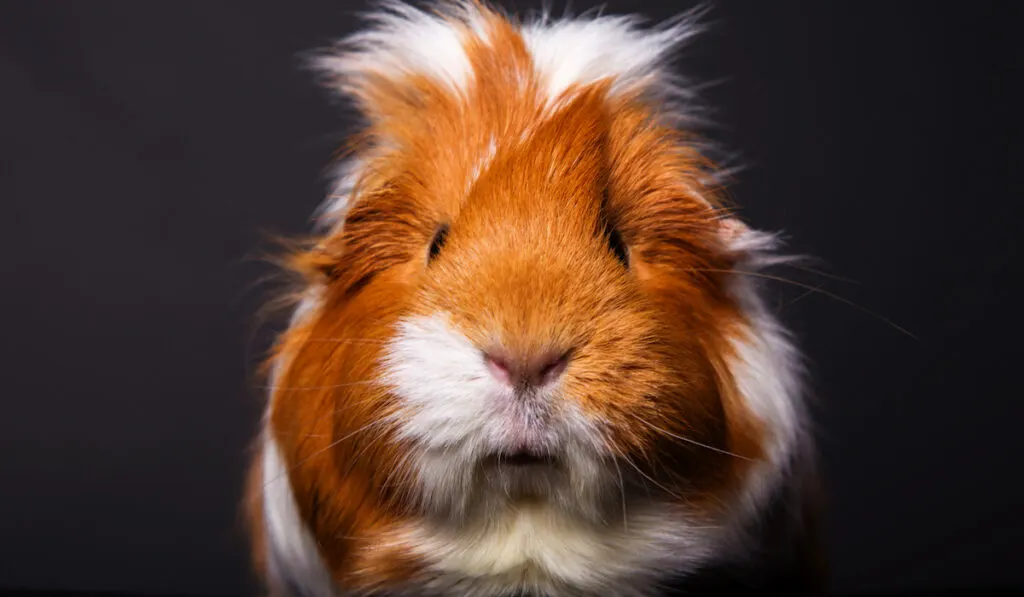Is it even a thing to eat poop? People certainly find the thought disgusting, but not these small rodents.
So why do they do it? Is it beneficial to them or do they just enjoy eating it? Read on for finer details.
Table of Contents
Do Guinea Pigs Eat Their Poop?
Guinea pigs will eat their poop.
However, what they eat is not essentially poop, as it is not the waste part of it but nutrient-filled forms of poop called cecotropes (better explained below).
Guinea pigs ingest back the cecotropes in a process called coprophagy.
Better explained, coprophagy is the entire process where the guinea pig forms and excretes cecotropes, then ingests them again for re-digestion and the re-absorption of vital nutrients that have not been absorbed during the first round of digestion.
If you have seen your guinea pig curled up sniffing their bottoms then they come out chewing on something, you must have witnessed coprophagy live in action being executed.
It is entirely normal and neither should you try to stop it nor rebuke your guinea pig for doing so. It is essential to them. Before we get to coprophagy and why it is important, do you know about guinea pig poop?

Types of Guinea Pig Poop
Even though both are generally referred to as poop, guinea pigs excrete two entirely distinct types of poop.
The one you always find and sweep out is the standard poop that is no longer useful to the guinea pig. It is distinguished by its hard texture and darker coloration.
This article’s interest lies with the second type of poop, the cecotropes. These are nutrient-dense poops resulting from the incompletely digested plant material and have to be ingested back through coprophagy.
This type is softer and stickier compared to the normal poop and has a lighter coloration often with a yellowish or greenish tinge accompanied by a smell.
Rodents and critters like guinea pigs, chinchillas, and rabbits have delicate digestive systems that cannot properly process and absorb all the nutrients in their regular hay feeds. For this, they often produce poop that is highly packed with nutrients after the first round of digestion, forming cecotropes.
Why Do Guinea Pigs Eat Cecotropes?
Guinea pigs need to re-eat their cecotropes to absorb the nutrients packed within. There are high chances that you will never see the cecotropes around the cage because they are quickly ingested as soon as they are defecated.
However, if you spot the cecotropes around the cage, chances are that your guinea pig might be having complications and will eventually face malnutrition.
For baby guinea pigs, coprophagy serves them best because it enables them to get a starter pack of enzymes and helps them smoothly transition from the mother’s milk to solid feeds.

Benefits of Coprophagy
As aforementioned, plant matter does not get entirely digested and the nutrients don’t get exhaustively absorbed after the first go at digestion, bringing in the significance of coprophagy.
Cecotropes are packed with essential nutrients like having half the fiber content and twice the protein levels of the hardened stool, vitamin K, vitamin B, and calcium. The low fiber levels help ease the re-digestion and absorption of nutrients in cecotropes.
Cecotropes harbor beneficial bacteria that promotes the guinea pig’s digestive health.
Guinea pigs can also borrow each other’s cecotropes whenever one is sick to help the other restore their gut health, leading to a general health improvement. In some instances, sick guinea pigs do not even have to steal another’s cecotropes but can ingest it right from the companion’s bottom.
Although antibiotics are potentially life-saving for guinea pigs, these small pets do not respond well to antibiotics.
Instead of only eliminating the unwanted intruders, antibiotics often end up killing both the bad and the good bacteria, resulting in a generally weak and unhealthy guinea pig.
If your guinea pig has been constantly or at times using antibiotics, it is recommended to offer it cecotropes from a healthy companion to help it re-introduce the good bacteria, gradually restoring its health.
How Often Do Guinea Pigs Eat Their Poop?
Whenever your guinea pig chews on something after cleaning its bottom, just know that it is chewing on cecotropes. At most times, you won’t even notice the cecotropes, as they are quickly ingested as soon as they are out. So try to figure out how many times your guinea pig does that.
For sure, there is no definite answer since it all depends on the guinea pig. However, studies have revealed an average of 100 – 200 times a day.

Do All Guinea Pigs Eat Their Poop?
Yes, all healthy guinea pigs eat their cecotropes to replenish their need for essential nutrients that would potentially go to waste over the first round of digestion.
If you notice that your guinea pig is not eating its cecotropes, there must be a serious underlying health issue, and the guinea pig risks facing malnutrition.
Can You Distinguish a Malnourished Guinea Pig by Its Poop?
Yes, healthy guinea pigs have poops distinct from malnourished ones.
Healthy guinea pigs produce a hardened and dark poop, while malnourished individuals will have their stools both in bright and dark colorations. This implies that they do not eat back their cecotropes and they end up missing vital nutrients.
What If a Guinea Pig Doesn’t Eat Its Poop?
In case a guinea pig fails to eat its cecotropes, it might be due to one of two reasons: first, the guinea pig might be seriously ill, or, the guinea pig is getting too old, and their muscles are starting to greatly fail them that they can no longer eat cecotropes.
Whenever these situations arise, they should not be taken lightly, and the pet’s vet should be informed immediately.
Conclusion
It is natural and normal for guinea pigs to eat their poop, and it is beneficial for them too. Therefore, you should not worry when you see your guinea pig eat its poop. It is a sign of perfect health.
However, you should have all the more reason to worry if your pet isn’t eating its cecotropes.
Resources:
- https://mypetguineapig.com/do-guinea-pigs-eat-their-poop/
- https://petkeen.com/why-guinea-pigs-eat-their-poop/
- http://www.calicavycollective.com/2011/11/its-normal-for-guinea-pigs-to-eat-their.html
- https://pethelpful.com/rodents/Why_Guinea_Pigs_Eat_Poo
- https://www.guineapigtube.com/coprophagy-in-guinea-pigs/
- https://squeaksscalesandtails.com/why-do-guinea-pigs-eat-poop/
- https://littlecavylove.wordpress.com/2016/04/21/help-my-guinea-pig-eats-their-poo/
